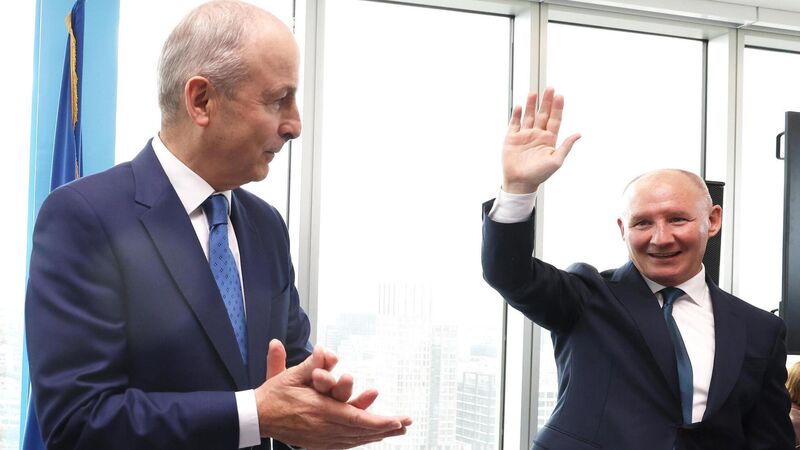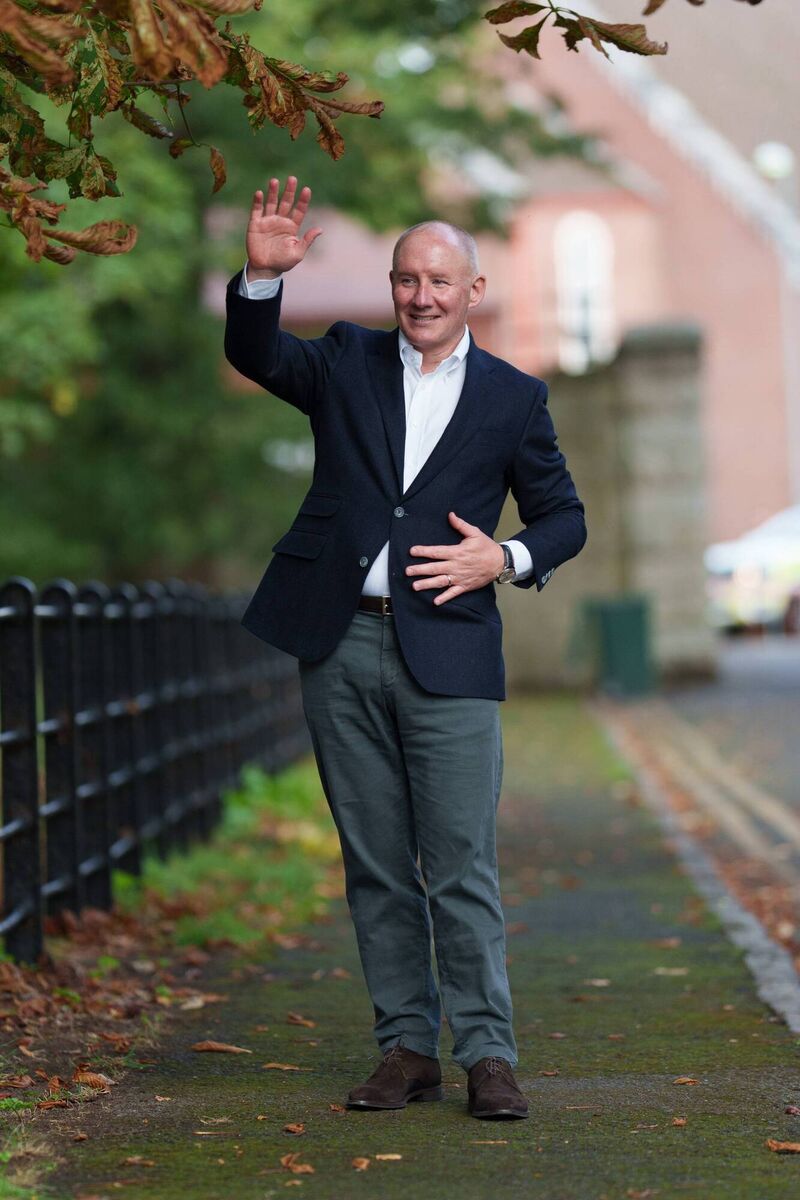Fergus Finlay: I have no sympathy for Jim Gavin — the whole thing was grubby

Micheál Martin (left) with Jim Gavin at the launch of Mr Gavin's presidential campaign. Fianna Fáil has let the country down badly in making such a mess of approaching this election. But it’s still an election that matters. And it’s still entirely in our own hands. File photo: Leah Farrell/©Rollingnnews.ie
On the one hand, haven’t I told ye right from the beginning how tough and unpredictable a presidential election is? Brace yourselves, I’ve always said. You just never know.
In the middle of September I wrote here that this year’s election would be about character, not ideology, and that we’d be watching people grow or shrink as the campaign went on. It didn’t take a genius to see that Jim Gavin was getting smaller and smaller in the harsh glare of a Presidential spotlight.
But on the other hand, mother of heavens holy moly, who’d have predicted the events of the weekend? It’s always been one of the primary rules of politics – even if it’s often the most ignored – that if you don’t want to get caught doing something, don’t do it in the first place.
Whenever you hear phrases like, I made a mistake, it was out of character, on reflection – they all mean the same thing. They’re just weasel words. They all mean I’ve been caught, and my only option is to fess up.
So I’m sorry, I’m afraid I have no sympathy for Jim Gavin.

The whole thing was grubby. He’s gone now, and the electorate — the rest of us — have to pick up the pieces.
Mind you, I can’t help wondering what Bertie’s thinking. I can almost hear him: “All's I know is if yiz had chosen me I’d never have been caught like that. And sure my life is an open book. It would have been no bother to me to deal with questions about three grand — sure I used to have more than that in me sock drawer.”
And there’s no sympathy surely for Fianna Fáil. For some reason, the entire party allowed an entirely closed process, with the leader ensuring that no-one was allowed to get a look in and ultimately forcing his own choice not just on the party but on the people.
It’s very reminiscent – eerily reminiscent in fact – of the moment Austin Curry came third in the presidential election in 1990. That entire campaign was seen as a major misjudgement by Alan Dukes, the then leader of Fine Gael. He didn’t last long after that.
I’ll tell you what my bottom line feeling is about the whole thing. It’s disgusting. It’s disgusting because this tawdry mess is throwing a cloud over the office of the presidency. No matter what happens now, the choice available to the people has been narrowed in a completely unacceptable way.
Luckily, there are still two candidates left – let’s hope and pray no more skeletons fall out of cupboards. Even as it is, the cloud over the office is going to lead to yet more debate, not just about the process of election but about whether we need a President at all.
If you know me at all, you’ll know I believe the presidency really matters. It’s unique, because each and every one of us gets to have a say in who holds the job. There is no-one else in Ireland required to take a solemn oath obliging himself or herself to “dedicate (their) abilities to the service and welfare of the people of Ireland”.
Here's the funny thing. That oath taken on inauguration day has always seemed to make a difference. No matter how our presidents have arrived in the office, no matter what the process, we’ve never had any reason to regret or be ashamed of any of them.
We look at them really critically when they’re candidates, but none of them has ever let us down. People have tended to grow in the office; to respond to the unique demands it makes of them. So we can be grateful that this issue was all found out and dealt with before the election.
We’ve been choosing Presidents in Ireland since 1938 – in fact, not counting the process we’re in now, we’ve done it 14 times, and we’ve had nine different presidents. On six of the 14 occasions, our political lords and masters decided they knew what was best for us and picked a president without giving us any say in the matter.
But some of the other occasions produced exciting and hard fought contests. I can still remember sharing my 16th birthday with Éamon de Valera’s second election (not a lot of people can say that!).
On that day I walked down with my father to what we used to call the technical school on the Florence Road in Bray as he went to cast his vote in the presidential election in 1966.
He wouldn’t tell me what way he was voting, and we had a bit of an argument because I said I couldn’t bring myself to vote for either of the candidates on offer. I had just finished reading a biography of Big Jim Larkin, and I’d already back then made up my mind that the party he had a hand in founding would someday offer people a real choice.
To be fair, 1966 was the first of the exciting presidential elections. As outgoing President, de Valera announced that it would be unseemly and inappropriate to engage in a political campaign. That initially suited really well, for two reasons.

First, he was 83, and unlikely to look too sprightly on the campaign trail. Second, it persuaded RTÉ that it wasn’t necessary to cover the campaign as a political event, guaranteeing his opponent Tom O’Higgins of Fine Gael equal billing.
The Fianna Fáil side of the house in that election (sure you can’t be up to them), announced that of course President de Valera wouldn’t be doing any unseemly political campaigning. He’d just be making a lot of public appearances because after all it was the 50th anniversary of the 1916 Rising. (All such “presidential” appearances were, of course, duly covered extensively by the national broadcaster, without the need to give his opponent equal time.)
Well over a million votes were cast in that election, and despite the odds being heavily stacked in his favour, de Valera squeaked through by about 10,000 votes, a margin of 1%. It came to be seen as a contest between youth and age (O’Higgins was 49), and between liberalism and conservatism. Ireland for sure was a different place then.
That election made its own impact on Ireland. To a much greater extent, of course, the presidential election in 1990 transformed Ireland.
Eventually history will see Mary Robinson’s election as a prime turning point between the old and the new, between a dark and oppressive past and a much more open and welcoming future. The day we elected Mary Robinson we made a statement about the Ireland we wanted to see.
And that’s still the reason it’s crucially important that we vote in a couple of weeks’ time. Fianna Fáil has let the country down badly in making such a mess of approaching this election. But it’s still an election that matters. And it’s still entirely in our own hands.






